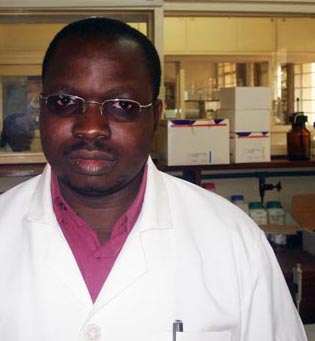You are Stronger When you are More than One
Interview with an IdeaConnection Problem Solver
Joseph Hawumba carried out the first study in Uganda on the characterization of thermophile bacteria from Ugandan hot springs. The research was for his Master’s degree in Biochemistry which he completed in 1997. Two years later he was off to the University of Pretoria in South Africa where he worked on his PhD.
 In 2004 he went back to Uganda’s Makerere University where he teaches biochemistry to science, medical, and veterinary students. He also carries out frontline scientific research, writes academic papers and has contributed several chapters to a book about bioremediation. Joseph was also part of a research team whose work formed the basis on which the World Bank is promoting composting technology in several countries in the developing world.
In 2004 he went back to Uganda’s Makerere University where he teaches biochemistry to science, medical, and veterinary students. He also carries out frontline scientific research, writes academic papers and has contributed several chapters to a book about bioremediation. Joseph was also part of a research team whose work formed the basis on which the World Bank is promoting composting technology in several countries in the developing world.The IdeaConnection concept is good because you collaborate, instead of it being one person solving a challenge. You are stronger when you are more than one and the solution becomes simplified. That was one of the major reasons that drew me to IdeaConnection because it attracts people from different fields to solve a problem.
How many challenges have you worked on?
So far I have worked on one, and I’m now on the second one, which I hope will be successful.
Was the first one successful?
Yes.
What was the nature of the problem?
Team members come from different education backgrounds. Some of us have expertise in chemistry or physics. Personally I have expertise in biochemistry and microbiology. So the nature of the challenge involved biochemistry, biophysics and bioengineering and required expertise in these areas. So in this situation a mixture of disciplines of engineering, microbiology and chemistry came up with the solution. The nature of the problem was such that it couldn’t be solved by one field.
What did the financial reward mean to you?
The financial reward was very great to me, and it was exciting to contribute ideas that worked. It is an incentive to do more challenges. It was wonderful.
When you start working on the problem with people from different backgrounds you develop a relationship which can become a friendship. And you tend to understand how people from different countries and cultures operate. It gives you confidence. The members tend to discuss everything with each other and collaborate which is very great.
The facilitator helps a lot. First of all the facilitator looks at the problem and focuses us on it. And he communicates all our hopes and solutions into a coherent summary. And we look at the summary and see a trend in the thinking. The facilitator helps us to come up with the solution.
How does the ThinkSpace help with problem solving?
The ThinkSpace does help, yes, but sometimes there’s a problem with the time zones for all the team members to meet up at the same time. It would be great if we were all somehow in the same time zone.
Overall, my view of IdeaConnection is that it is a great innovation because when somebody thinks alone they might think their idea is great but it may not be. When you are a part of a team if your idea is not quite there you can correct it as others are contributing. And when everyone is giving their opinions you get a very good refined solution in the end. It also connects people from different walks of life. I’ve been able to work with people from India, Canada and the Netherlands at the same time. I think the IdeaConnection concept is great.
